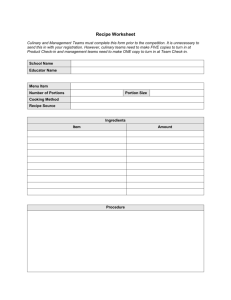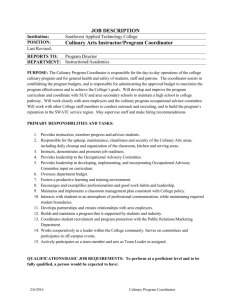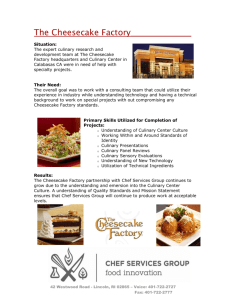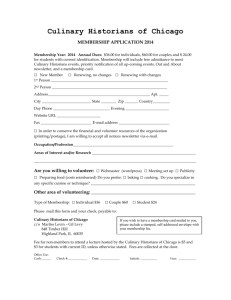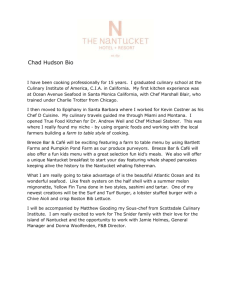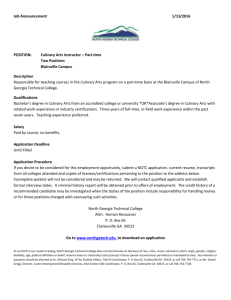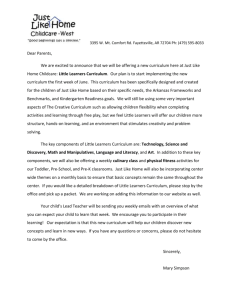Culinary Arts II- Spring 2012 Essential Questions: Textbooks
advertisement
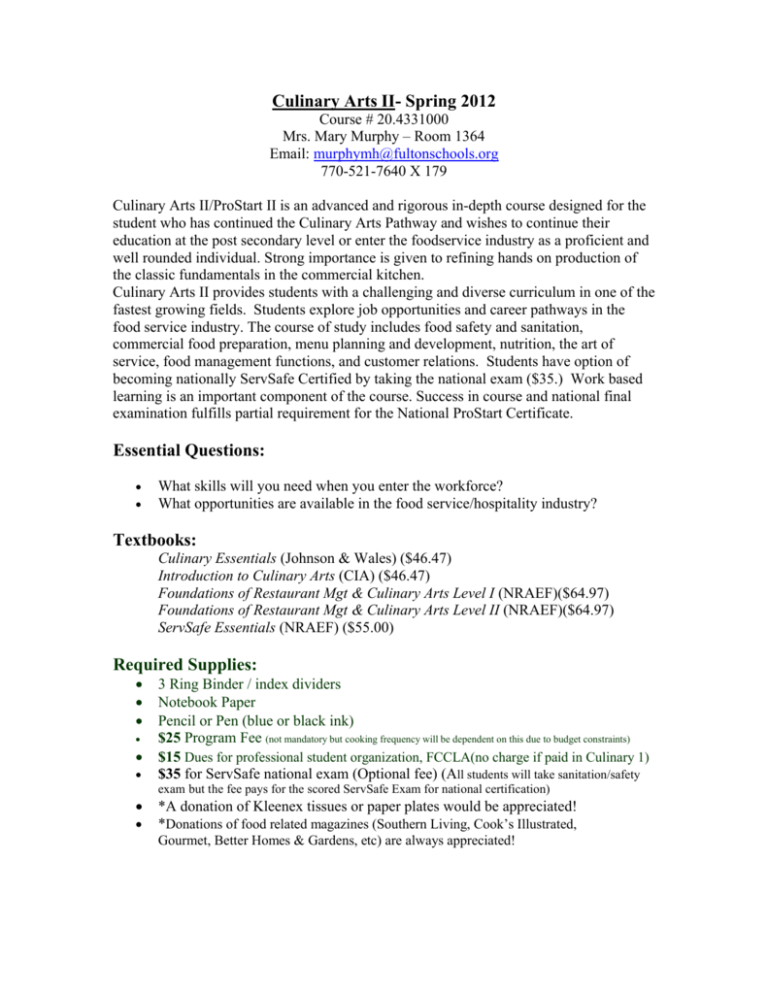
Culinary Arts II- Spring 2012 Course # 20.4331000 Mrs. Mary Murphy – Room 1364 Email: murphymh@fultonschools.org 770-521-7640 X 179 Culinary Arts II/ProStart II is an advanced and rigorous in-depth course designed for the student who has continued the Culinary Arts Pathway and wishes to continue their education at the post secondary level or enter the foodservice industry as a proficient and well rounded individual. Strong importance is given to refining hands on production of the classic fundamentals in the commercial kitchen. Culinary Arts II provides students with a challenging and diverse curriculum in one of the fastest growing fields. Students explore job opportunities and career pathways in the food service industry. The course of study includes food safety and sanitation, commercial food preparation, menu planning and development, nutrition, the art of service, food management functions, and customer relations. Students have option of becoming nationally ServSafe Certified by taking the national exam ($35.) Work based learning is an important component of the course. Success in course and national final examination fulfills partial requirement for the National ProStart Certificate. Essential Questions: What skills will you need when you enter the workforce? What opportunities are available in the food service/hospitality industry? Textbooks: Culinary Essentials (Johnson & Wales) ($46.47) Introduction to Culinary Arts (CIA) ($46.47) Foundations of Restaurant Mgt & Culinary Arts Level I (NRAEF)($64.97) Foundations of Restaurant Mgt & Culinary Arts Level II (NRAEF)($64.97) ServSafe Essentials (NRAEF) ($55.00) Required Supplies: 3 Ring Binder / index dividers Notebook Paper Pencil or Pen (blue or black ink) $25 Program Fee (not mandatory but cooking frequency will be dependent on this due to budget constraints) $15 Dues for professional student organization, FCCLA(no charge if paid in Culinary 1) $35 for ServSafe national exam (Optional fee) (All students will take sanitation/safety exam but the fee pays for the scored ServSafe Exam for national certification) *A donation of Kleenex tissues or paper plates would be appreciated! *Donations of food related magazines (Southern Living, Cook’s Illustrated, Gourmet, Better Homes & Gardens, etc) are always appreciated! Dress Code for Foods Labs: (for safety reasons) non-skid, oil-proof, closed-toe shoes, no jewelry, pants (no shorts or skirts,) (black pants are required for catering- no exceptions!) tailored shirt (no flowing sleeves), restrained hair(tied back or under hair net and/or hats), apron or chef’s coat* (If you are not prepared with appropriate dress, you forfeit the opportunity to work in the foods lab, must do an alternative written assignment, and lose points for the day.) Course Requirements: Due to the work based nature of this course and in preparation for the world of work, several activities will be required of each student: 1. A culinary presentation (food demonstration) exhibiting course level preparation techniques. Food tasting will be a component. 2. Catering event participation- this may involve outside class time; requires promptness; will not exceed 2 times per month; earns hours towards National ProStart Certification. 3. Food Preparation Home Experiences (3 times per reporting period) – may be brought to school for food tasting. 4. Groceries brought from home for recipe preparation – on occasional basis in order to allow more frequent or student- involved food preparations. 5. Participation in Culinary Arts and FCCLA Fundraising and Entrepreneurship experiences. Sales to benefit the culinary arts program. 6. Required Exams (in addition to regular quizzes and tests): a. ProStart 2 National Exam (cost covered by HEFG, Hospitality Education Foundation of Georgia) b. End of Pathway Assessment (EOPA) – county mandated- AAFCS Culinary Arts Pre-Professional Assessment c. ServSafe Exam (Nationally scored if you pay($35) for the exam( a score of 75 will earn you a 5 year national certificate) 7. Career Portfolio including personal resume and documentation of food preparation experiences (archived work, photographs, etc) 8. (Extra Credit) Arrange a speaker from the food service or hospitality industry for informative and networking purposes. May include parents, relatives,school staff, and community members. 9. (Extra Credit) 4 hours of job shadowing in a food service or hospitality facility including completion of written evaluation of the experience. Classroom Policies: (Detailed Expectations & Policies sheet attached) 1. 2. 3. 4. Be prepared with supplies and work on a daily basis. Be on time- in your seat when the bell rings- ready to work. Be positive and respectful to all. Be neat- all materials must be returned to their proper location and all workspace must be clean before students will be dismissed. 5. In all culinary labs and experiences – Wear appropriate dress and follow all rules for safety and sanitation. Grading Procedures: 30 % 25 % 30 % 15 % Daily Work, Professionalism (attendance, effort, work ethic) Labs Tests, Quizzes, Projects Final Exam (practical & written) All assignments must be kept in your 3 ring binder and include your name, period, and date. Late assignments will have ten points deducted for each day late. After 3 days late, the assignment will not be accepted. Each student is responsible for checking on missed assignments and scheduling test make ups. Tests must be made up within one week. The Professionalism/Work Ethics assessments consider absences, tardies, participation, respect, teamwork, and follow through of classroom guidelines. Course Units: Unit 1: Stocks, Soups, and Sauces (& review of seasonings) Unit 2: Grains, Legumes, and Pasta Unit 3: The Art of Service/ Lodging Unit 4: Meat, Poultry, and Fish Unit 5: International and Regional Cuisine Unit 6: Desserts and Baked Goods Unit 7: ServSafe Unit 8: Menu Development & Nutrition Unit 9: Food Costing, Purchasing, & Inventory Control Course Topics: A: Professionalism and Careers in Foodservice B: Culinary Fundamentals C: Menu Development and Nutrition D: Front of the House and Management Dress Code for Foods Labs & Catering: (for safety reasons) non-skid, oilproof, closed-toe shoes, no jewelry, chef coat, checkered chef pants (no shorts or skirts,) restrained hair & chef cap (skull cap,) apron (If you are not prepared with appropriate dress, you forfeit the opportunity to work in the foods lab, must do an alternative written assignment, and lose points for the day.) Student Organization- FCCLA The Family, Career, and Community Leaders of America (FCCLA) is the student organization associated with the Culinary Arts Department. Our chapter is affiliated with the state and national organizations and helps students develop leadership skills. Dues are $15 and related activities are integrated throughout the curriculum as well as through meetings before and/or after school. Grading Procedures: 50 % Daily Work, Professionalism (attendance, effort, work ethic) 25 % Labs & Projects 10 % Tests & Quizzes 15 % Final Exam (practical & written) Late assignments will have ten points deducted for each day late. After 3 days late, the assignment will not be accepted. Each student is responsible for checking on missed assignments and scheduling test make ups. Tests must be made up within one week. Professionalism/Work Ethics assessments consider absences, tardies, participation, respect, teamwork, and follow through of classroom guidelines. Attendance Policy: Attendance is very important in a lab/activity class. Excessive absences and tardiness can impact your grade. You must be present and on time to earn full credit for class on a daily basis. Tardiness will be marked in the computer attendance. If you walk in class after the last bell rings, you will be considered tardy. You will need to sign in on a sheet provided by teacher. At the 3rd tardy, your parent will be notified and you will receive a detention with me. Any additional tardies will be reported to administration. You may miss one lab per semester that does not need to be made up and will not affect your grade. Two or more lab absences will require each lab to be made up. Lab make up forms are available from Mrs. Murphy – includes mise en place, cooking, cleaning, food sample, & written evaluation parent signature. Make-up Work: 1. You have 1 week (5 school days) to make up work, including tests. 2. Tests must be made up before or after school and student must make prior arrangements with Mrs. Murphy. 3. Any make up work not received after 1 week will be recorded as a zero. 4. It is YOUR responsibility to find out what work was missed and to make it up. Instructor Support: Mrs. Murphy will be available for instructional support (RISE) on Monday mornings from 7:30-8:30 am or by setting up another time with her. Please see or email Mrs. Murphy to set up an appointment for extra help or to discuss any concerns. Parents, I encourage you to contact me before or after school. My email is murphymh@fultonschools.org. My school telephone number is 770-521-7640 Ext. 179. Parent Communication Please monitor your student’s progress (both attendance and grades) with E-School. The most efficient way to communicate with me is by e-mail, murphymh@fultonschools.org. RISE: Reteaching Instructional Support & Enrichment a. RISE is an opportunity for students to relearn course standards OR receive other instructional support in the form of more focused instruction from their teachers. b. All teachers are available for extra help, should a student want or need it. However, once a student’s course average drops below a 75, RISE policy requires that the student AND parent be notified AND that the student spend a minimum of 30 minutes per week with the teacher for that course (or another teacher of the same course) until the student attains a course average of 75*. c. RISE sessions are offered according to the schedule below in order to avoid conflicts with individual teachers’ office hours. Departmental RISE Schedule: Mondays: All Electives (Lunch/PM) Tuesday: Language Arts (AM/Lunch) Wednesday: Science (AM/Lunch/PM) Thursday: Math (AM/Lunch) Friday: Social Studies (AM/Lunch) d. RISE is separate from and should not be confused with FCS Recovery policy. * If the below-75 student average is a consequence of failure to make up work missed when absent, student should follow the teacher’s standard make-up policy. Provision for Improving Grades (Recovery) 1. Opportunities designed to allow students to recover from a low or failing cumulative grade will be allowed after all work required to date has been completed, and the student has demonstrated a legitimate effort to meet all course requirements including attendance. Students should contact the teacher concerning recovery opportunities. Teachers are expected to establish a reasonable time period for recovery work to be completed during the semester. All recovery work must be directly related to course objectives and must be completed ten school days prior to the end of the semester. 2. Teachers will determine when and how students with extenuating circumstances may improve their grades. Alpharetta High School Academic Honesty Expectations It is the sincere hope of the AHS administration & faculty that all students will demonstrate the highest level of academic honesty. Violations of the AHS Academic Honesty Expectations include but are not limited to the following: 1.) using words or ideas from a published source without proper documentation;* 2.) using the work of another student (e.g. copying another student’s homework, composition, or project); 3.) using excessive editing suggestions of another student, teacher, parent, or paid editor; 4.) using any electronic device for sharing information prior to, during, or after a graded experience. *plagiarism-the use of another’s words or ideas and the presentation of them as though they are entirely one’s own. Failure to meet these expectations on any graded experience, project, or paper will result in a zero on the assignment, an honor code violation, and two days of Saturday School. Parent/Student notification and administering of the consequences will be done by the teacher and grade-level administrator. Unless stipulated by the teacher, collaboration on graded experiences is not acceptable. Students who willingly provide other students with access to their work are in violation of the Alpharetta High School Honor Code. Internet and Network Usage: 1. 2. 3. 4. Alpharetta High School and Fulton County School System rules apply. Internet use is a privilege and must support academic projects (it must pertain to a class assignment). Logging in as someone else and/or sharing login and password information will be grounds for a discipline referral. Misuse of the server, visits to inappropriate web sites, sending personal e-mails, instant messaging, or other unauthorized use of the Internet will be grounds for a discipline referral. Department Mission and Philosophy The mission of Alpharetta High School’s Culinary Arts Department is to provide a rigorous, career-focused education integrating academic and technical standards while preparing students for the global economy. We believe all students should have access to quality education that prepares them for a rewarding career. Students should be provided educational experiences to help them become effective problem-solvers with an emphasis on life-long learning in an increasingly interdependent world. We believe that students should be provided with programs of study for viable careers currently in demand using advanced technology to learn the technical expertise needed to become part of a skilled workforce. As educators, we must continue to be diligent in providing opportunities for all students to adapt to technological and social changes in order to meet the expanding needs of industry and business. Career Tech Assessments The Georgia Department of Education has made available two assessments to ascertain the competence of our career technology students. The assessments are Work-Ready and End-of-Pathway. The Work-Ready assessment measures the skills of Georgia’s workers, determines valuable job training opportunities, and assures companies that the state can provide a long-term, qualified labor supply, and is a requirement for some Georgia jobs. The End-of-Pathway assessment measures the level of technical skill attainment of each career pathway completer. The Work-Ready assessment will be administered to all work-based learning students and all seniors currently enrolled in a career technology course. The End-of-Pathway assessments will be administered to all career technology students who are finishing a pathway. Tests will be administered in October and April. Lost/damaged Book Policy Students are financially responsible for all books issued by Alpharetta High School. Textbooks may not be left in classrooms, and teachers are not responsible for students’ books once books have been issued to the student. The copy issued to the student must be turned in at the end of the course. Students will not receive credit for turning in another student’s book, and students may not turn in replacement books. The cost of replacement will be assigned to any student that fails to turn in the exact book she/he was issued and/or to any student that turns in a damaged book. If a student is issued a damaged book (i.e. broken binding, torn pages, water damage, writing, etc…), then the book must be brought to room 1330 for a replacement book or to document the damage. There is a two week grace period for students to document damage before the student will be held accountable. Course Standards: CA-CAII-1. Students will identify skills, certifications, and experience required for careers in the hospitality, tourism and foodservice industries. a. Discuss and trace the differences and similarities of various types of international and regional cuisines. b. Discuss pros and cons of various food service organizations (national, state, and local) and their relation to students and food service professionals. c. Identify types of establishments, job titles, duties, employment opportunities, and benefits at local, state, and national levels. d. Name, describe, and discuss the various food service styles and basic concepts of culinary management. e. Identify, describe, and discuss the roles, responsibilities, and various salaries of supervising and the various aspects of the management team and describe various types of scheduling approaches. ACADEMIC STANDARDS: ELA10 RC3. The student acquires new vocabulary in each content area and uses it correctly. ELA11LSV1. The student participates in student-to-teacher, student-to-student and group verbal interactions. ELARL5. The student participates in student-to-teacher, student-to-student and group verbal interactions NFCS-8.1. Analyze career paths within the food production and food service industries. CA-CAII-2. Students will examine and apply the principals of food sanitation and safety in foodservice operations and kitchen environments to achieve a nationally recognized food safety certification. a. Follow state and local sanitation and safety codes. b. Demonstrate sanitary procedures in food receiving, sorting, storage, preparation, cooking, holding, cooling, reheating, and service. c. Identify security measures for a facility, food, equipment, and personal safety. d. Demonstrate proper use, care, and cleaning of commercial foodservice equipment and facilities. ACADEMIC STANDARDS: SSCG17. The student will demonstrate knowledge of the organization and powers of state and local government described in the Georgia Constitution. SCSh2. Students will use standard safety practices for all classroom laboratory and field investigations. NFCS-8.3. Demonstrate food safety and sanitation procedures. CA-CAII-3. Students will demonstrate and master commercial food preparation of all menu categories to produce a variety of food products. a. Identify and prepare regional, ethnic, and international cuisines. b. Compare and contrast food items prepared using moist heat, dry heat, and combination cooking methods using various types of foodservice equipment such as a range, oven, fryer, griddle, steamer etc. c. Fabricate and prepare various meats, poultry, and seafood using both moist and dry heat cooking methods. d. Prepare stocks, soups and sauces and match with appropriate foods. e. Prepare vegetables, fruits and starches (pasta, grains, etc.) by using moist and dry heat cooking methods. ACADEMIC STANDARDS: SSWG2. The student will explain the cultural aspects of geography. SC5. Students will understand that the rate at which a chemical reaction occurs can be affected by changing concentration, temperature, or pressure and the addition of a catalyst. NFCS-8.5.2. Demonstrate a variety of cooking methods including roasting and baking, broiling, smoking, grilling, sautéing, frying, deep frying, braising, stewing, poaching, steaming, working, convection, microwaving, and other emerging technologies. CA-CAII-4. Students will discuss and practice Garde Manger. a. Plan, prepare, and display hot and cold hors d’oeuvres, salads, sandwiches, relishes, canapés, garnishes, carvings, and decorations. b. Plan and execute a theme banquet to include menu selection, banquet layout and design, and food presentation using platters, bowls, mirrors, etc. c. Prepare various food art presentations using edible food products. ACADEMIC STANDARDS: ELAALRC4. The student establishes a context for information acquired by reading across subject areas. NFCS-8.5. Demonstrate commercial preparation for all menu categories to produce a variety of food products. CA-CAII-5. Students will demonstrate and master the commercial preparation of all fundamental bakery categories to produce a variety of baked, pastry, and dessert products. a. Demonstrate the proper principles of baking and identifying formulas used to increase and decrease recipes as well as baking ingredients. b. Apply the proper principles of baking to custards, gelatin products, glazing tarts, crème brulees, crème anglaises, holiday breads and cakes, pate a choux, chocolates, and tempering. c. Demonstrate proper use, care, and cleaning of mixers, ovens, cutlery, scales, hand utensils, pots, and baking pans. d. Demonstrate proper use and storage of baking supplies. e. Identify, demonstrate, and use the proper procedures to weigh and measure dry and liquid baking ingredients using the English or metric system. ACADEMIC STANDARDS: MC4P5. Students will represent mathematics in multiple ways. SCSh4. Students will use tools and instruments for observing, measuring, and manipulating scientific equipment and materials. NFCS-8.5. Demonstrate commercial preparation for all menu categories to produce a variety of food products. CA-CAII-6. Students will identify and apply practices required for menu planning and development, purchasing and receiving, cost control and analysis, and marketing functions in quality food service operations. a. List basic menu planning principles, discuss the various types of restaurant menus and their importance to the overall operation of the facility, and define a la carte, table d'hotel, California, du jour, and cycle menus. b. Demonstrate procedures for purchasing meat, poultry, fish, dairy and staple items and describe proper techniques of receiving and storing fresh, frozen, refrigerated, and staple goods. c. Analyze written specifications for a variety of food products and describe their importance on food and labor controls. d. Explain proper receiving and storing of cleaning supplies, chemicals, and nonfood products. e. Describe HACCP critical control points managed by the purchasing and receiving functions. f. Identify and demonstrate standard procedures for calculating and controlling food, beverage, and labor costs. g. Demonstrate the process of costing recipes and menu items. h. Calculate recipe costs and pricing per portion (purchased and edible portion). i. Discuss ethical issues related to purchasing and inventory control in a foodservice operation. j. Identify the components of a marketing plan and analyze local area/marketing segment information. ACADEMIC STANDARDS: MC1P1. Student will solve problems using appropriately technology. ELA10 W3. The student uses research and technology to support writing. ELA10 RC3. The student acquires new vocabulary in each content area and uses correctly. SSEF1. The student will explain why limited productive resources and unlimited wants result in scarcity, opportunity costs and trade offs for individuals, businesses and governments NFCS-8.6. Demonstrate implementation of food service management functions. CA-CAII-7. Students will identify and apply basic nutritional information on the effects of the structures and functions of nutrients before, during, and after food preparation and processing. a. Evaluate Recommended Dietary Allowances (RDAs) and the Food Guide Pyramid to plan meals. b. Demonstrate food preparation techniques that conserve nutrients and make recipes more healthful. c. Demonstrate food ingredient substitution techniques for various diets such as food allergy, vegetarian, low-sodium, low fat, and reduced calorie. d. Analyze the impact food processing and preservation techniques have on the nutritive value of food. ACADEMIC STANDARDS: SCSh5. Students will demonstrate the computation and estimation skills necessary for analyzing data and developing reasonable scientific explanations. NFCS-9.3. Evaluate nutrition principles, food plans, preparation techniques, and Specialized dietary plans. CA-CAII-8. Students will identify and apply dining room operations. a. List and describe the rules and responsibilities of all dining room personnel and explain the various types of service delivery such as cafeteria, quick service, buffet, and table. b. Explain the role of quality service and how customer satisfaction directly affects a foodservice establishment’s success. c. Demonstrate the similarities and differences between American, French, English, Russian, and self service styles of dining. d. Describe and demonstrate tableside preparations such as a la’minute dishes, carving meats, and slicing desserts. e. Describe various procedures for processing guest checks. f. Describe sales techniques for food service personnel including menu knowledge and suggestive selling. ACADEMIC STANDARDS: ELAALRC3. The student acquires new vocabulary in each content area and uses it correctly. ELAALRC2. The student participates in discussions related to curricular learning in all subject areas. NFCS-9.3. Demonstrate the concept of internal and external customer service. CA-CAII-9. Students will identify and demonstrate practices required for commercial food service operations management. a. Identify general requirements to start up an on/off premise catering business to include but not limited to insurance, licensing, advertising, record maintenance, purchasing guidelines, and inventory storage. b. Create and develop a concept restaurant’s marketing plan, menu, facility layout, and design. ACADEMIC STANDARDS: ELA10RL5. The student understands and acquires new vocabulary and uses it correctly in reading and writing. MC4N1. Students will represent and operate with complex numbers. NFCS-9.3. Demonstrate implementation of food service management functions. Reading Standard Comment After the elementary years, students engage in reading for learning. This process sweeps across all disciplinary domains. Students must learn through reading the communities of discourse of each of those disciplines. Each subject has its own specific vocabulary, and for students to excel in all subjects, they must learn the specific vocabulary of those subject areas in context. Reading across curriculum content develops both academic and personal interests in students. As students read, they develop both content and contextual vocabulary. They also build good habits for reading, researching, and learning. The Reading Across the Curriculum standard focuses on the academic and personal skills students acquire as they read in all areas of learning. MRC. Students will enhance reading in all curriculum areas by: a. Reading in all curriculum areas b. Discussing books and articles. c. Building vocabulary knowledge . d. Establishing context CTAE Foundation Skills The Foundation Skills for Career, Technical and Agricultural Education (CTAE) are critical competencies that students pursuing any career pathway should exhibit to be successful. As core standards for all career pathways in all program concentrations, these skills link career, technical and agricultural education to the state’s academic performance standards. The CTAE Foundation Skills are aligned to the foundation of the U. S. Department of Education’s 16 Career Clusters. Endorsed by the National Career Technical Education Foundation (NCTEF) and the National Association of State Directors of Career Technical Education Consortium (NASDCTEc), the foundation skills were developed from an analysis of all pathways in the sixteen occupational areas. These standards were identified and validated by a national advisory group of employers, secondary and postsecondary educators, labor associations, and other stakeholders. The Knowledge and Skills provide learners a broad foundation for managing lifelong learning and career transitions in a rapidly changing economy. CTAE-FS-1 Technical Skills: Learners achieve technical content skills necessary to pursue the full range of careers for all pathways in the program concentration. CTAE-FS-2 Academic Foundations: Learners achieve state academic standards at or above grade level. CTAE-FS-3 Communications: Learners use various communication skills in expressing and interpreting information. CTAE-FS-4 Problem Solving and Critical Thinking: Learners define and solve problems, and use problem-solving and improvement methods and tools. CTAE-FS-5 Information Technology Applications: Learners use multiple information technology devices to access, organize, process, transmit, and communicate information. CTAE-FS-6 Systems: Learners understand a variety of organizational structures and functions. CTAE-FS-7 Safety, Health and Environment: Learners employ safety, health and environmental management systems in corporations and comprehend their importance to organizational performance and regulatory compliance. CTAE-FS-8 Leadership and Teamwork: Learners apply leadership and teamwork skills in collaborating with others to accomplish organizational goals and objectives. CTAE-FS-9 Ethics and Legal Responsibilities: Learners commit to work ethics, behavior, and legal responsibilities in the workplace. CTAE-FS-10 Career Development: Learners plan and manage academic-career plans and employment relations. CTAE-FS-11 Entrepreneurship: Learners demonstrate understanding of concepts, processes, and behaviors associated with successful entrepreneurial performance Parents or Guardians: (Please neatly print email address and sign to acknowledge receipt and understanding of all policies and procedures for culinary arts. Student must print email address, sign and return to Mrs. Murphy by due date) If you have contacts in the food service industry (for speakers, demonstrators, field trips, work opportunities, etc.) that might be willing to share their expertise with us, please list below including the speciality or contact Mrs. Murphy. (Please include yourself) _______________________________________________________________________ I give permission for my child to view curriculum related PG-13 film during class. I give permission for my child to be photographed during class activities. I give permission for my child’s participation in the co-curricular student organization, FCCLA. Student Signature__________________________________________Date___________ Student Email ____________________________________________________________ Parent Signature___________________________________________ Date___________ Parent Email(s) __________________________________________________________ __________________________________________________________
